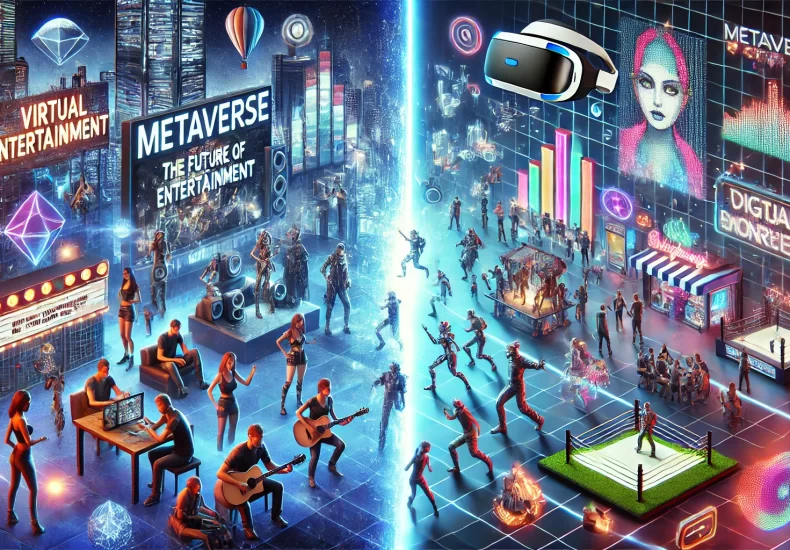
Is Metaverse the Future of Entertainment?
Metaverse: The Future of Entertainment or Just a Digital Gimmick?
Date: November 11, 2024
Author: Gildarts
The Metaverse has rapidly evolved from a buzzword to a digital reality, sparking both excitement and skepticism. As immersive technologies like virtual reality (VR) and augmented reality (AR) gain traction, many are asking: is the Metaverse the future of entertainment, offering limitless possibilities for virtual worlds, or is it merely a digital gimmick that will fade as quickly as it arrived? In this article, we will explore both sides of the debate, examining the potential of the Metaverse to revolutionize entertainment, as well as the challenges and criticisms it faces in becoming a mainstream phenomenon.
New York, USA – The term "Metaverse" has been buzzing in the tech and entertainment industries for a while now. Promoted as an immersive digital universe where users can interact, socialize, work, and entertain themselves, the Metaverse has sparked both excitement and skepticism. While some believe it is the next frontier of entertainment, others argue that it’s just another overhyped digital gimmick.
So, is the Metaverse truly the future of entertainment, or is it destined to become just another fleeting trend?
What Is the Metaverse?
The Metaverse refers to a virtual, shared universe, accessible via augmented reality (AR) and virtual reality (VR), where users interact with each other and digital environments through avatars. It promises to break down the boundaries between digital and physical experiences, offering new ways to socialize, play games, attend events, and even shop in an entirely virtual world. Major tech companies like Meta (formerly Facebook), Microsoft, and Epic Games are investing heavily to bring the Metaverse to life.
The Metaverse as the Future of Entertainment
Proponents of the Metaverse argue that it could revolutionize the entertainment industry. From virtual concerts to immersive movie experiences, the possibilities are endless. For instance, popular musicians like Travis Scott and Ariana Grande have held virtual concerts within the game Fortnite, attracting millions of viewers and providing fans with a new, interactive way to enjoy live music.
Virtual reality experiences are also expanding in the film industry, with some filmmakers experimenting with VR to allow viewers to immerse themselves in stories in ways that traditional media can’t replicate. Similarly, gaming companies are building vast Metaverse worlds where players can not only play games but also interact socially, attend virtual events, and even create their own content.
The Metaverse could also bring about new forms of interactive content, where the audience has a more active role in shaping the narrative. This level of engagement, combined with the sense of presence that VR provides, could make entertainment in the Metaverse much more personal and dynamic than anything we’ve seen before.
But Is It Just a Digital Gimmick?
While the potential is there, the question remains: Is the Metaverse really the future of entertainment, or is it just another digital gimmick?
One of the biggest challenges facing the Metaverse is accessibility. While VR headsets are becoming more affordable, not everyone has the necessary hardware to fully engage with the Metaverse. Most users still rely on smartphones or computers that don’t support the immersive experiences promised by the Metaverse. This limited accessibility may hinder mass adoption in the short term.
Additionally, many early experiences in the Metaverse have been criticized for being clunky and technically imperfect. Virtual environments often lack the photorealistic quality that people expect from modern entertainment, and user interactions can feel awkward. Technical glitches, lag, and low-quality avatars can break the immersion, making it difficult for some users to fully embrace the Metaverse.
There is also the issue of consumer interest. While some people enjoy virtual events or digital experiences, it’s unclear whether the average person will be willing to spend extended periods of time in a virtual world when traditional forms of entertainment—like streaming movies or playing console games—are still so accessible and enjoyable.
The Future of the Metaverse: Game-Changer or Flash in the Pan?
Looking ahead, the Metaverse holds immense potential to change the entertainment landscape. As technology improves, the Metaverse could become a truly immersive and seamless experience, offering new forms of storytelling and interactivity. However, it remains to be seen whether this vision will be fully realized or if it will become a passing trend.
For the Metaverse to succeed, it needs to overcome several hurdles, including improving the user experience, increasing accessibility, and proving its long-term value to consumers. Only time will tell whether the Metaverse is the next big thing in entertainment or just another digital gimmick that fades away with the hype.
Are you ready to step into the Metaverse and redefine entertainment, or do you prefer the comfort of traditional media? The choice, for now, remains yours.